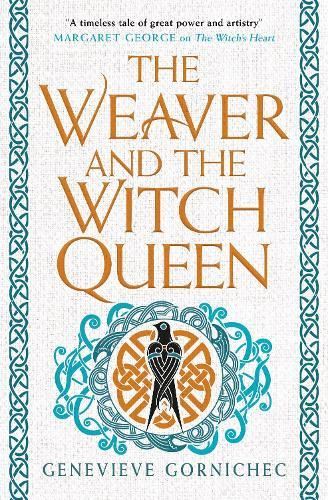 Title: The Weaver and the Witch Queen
Title: The Weaver and the Witch Queen
Author: Genevieve Gornichec
Reviewer: Natalie Lincoln
Audience: Middle High School
“… a woman need not be defined by her men…she can stand for herself and make her own way” (p490)
Genevieve Gornichec’s historical fantasy, The Weaver and the Witch Queen, begins in the adolescence of protagonist, Gunnhild, and sisters, Signy and Oddny. Here we are introduced to the backstory of these Viking women – each with their own courageous story to tell. Gunnhild suffers an unpleasant mother, while her friends are victim to their farm being raided, leaving them tragically separated. Their bonds are strong, though it remains to be seen if they are deep enough to overcome the challenges before them – from those that wish them harm, and from those they fall in love with.
This novel is about women. Like many speculative fiction works, it delves into diversity and we are presented with an array of characters who enable a reader to explore the many guises people come in. What is enjoyable is the matter of fact nature of the characters and their exploits – Gunnhild’s wrestle with her conscience and marriage, Oddny’s monthly trials with her periods, and Signy’s silence about her traumatic ‘lost’ years when sold into slavery. Life, alongside the magic and mythology, happens in a very human way.
Beside the female characters are a host of male counterparts – they too trying to navigate power structures and relationships in a Viking world. An unquestioned respect for the women in their lives and their importance to community is prevalent. Though steeped in hierarchy, Viking society doesn’t shy away from acknowledging the role of women in all aspects of life.
Thematically, the novel seeks women’s truth. That being, as Oddny declares, “… a woman need not be defined by her men…she can stand for herself and make her own way” (p490). Alongside this, the story touches upon queerness and provides an interpretation of how a transgender person may have lived – providing, as is Gornichec’s style, a ‘real life’ representatiion of that diversity which has for so long been omitted from narratives. The novel is also about friendship, loyalty and the notion that family is what we make it.
While the novel may involve witches, seers and magical animals, it primarily deals with real life. Life for women and the many paths they may follow. It is an authentic life, and for that it can be harsh. With true friends, and a sprinkling of magic, there is the possibility and hope that one can find the joy of both independence and connection with others. Highly engaging and readable, The Weaver and the Witch Queen would be best suited to middle high school aged students.